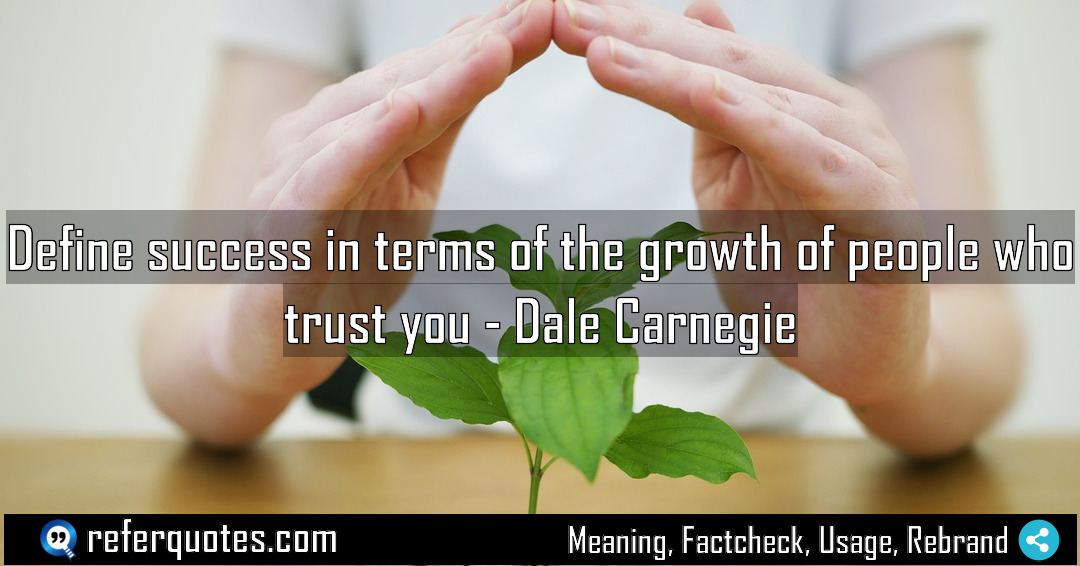
Forget the corner office and the big title. Real success? It’s about the growth of people who trust you. That’s the game-changer most leaders miss completely.
Share Image Quote:
Table of Contents
Meaning
This quote flips the script on traditional success. It says your achievements are meaningless unless they’re built on a foundation of trust and have actively helped others grow.
Explanation
Let me break this down from experience. Most of us are conditioned to chase metrics—revenue, market share, personal accolades. But here’s the thing I’ve seen over and over: those are just outcomes. They’re lagging indicators.
This philosophy makes trust your primary asset and people’s growth your key performance indicator. When someone trusts you, they’re open. They take your advice. They take calculated risks. They grow. And when they grow, your team, your company, your entire sphere of influence grows with them. It’s a virtuous cycle. It’s not about being liked; it’s about being effective by being credible.
Quote Summary
Reading Level44
Aesthetic Score72
Origin & Factcheck
This wisdom comes straight from the folks at Dale Carnegie & Associates, published in their 1993 book, “The Leader In You.” It’s a distillation of the core Carnegie principles for a modern audience. Sometimes people mistakenly attribute it directly to Dale Carnegie himself, but he passed away decades before this book was written. The sentiment, however, is 100% pure Carnegie.
Attribution Summary
Author Bio
Dale Carnegie(1888), an American writer received worldwide recognition for his influential books on relationship, leadership, and public speaking. His books and courses focus on human relations, and self confidence as the foundation for success. Among his timeless classics, the Dale Carnegie book list includes How to Win Friends and Influence People is the most influential which inspires millions even today for professional growth.
Official Website |Facebook | X | Instagram | YouTube |
Where is this quotation located?
| Quotation | Define success in terms of the growth of people who trust you |
| Book Details | Publication Year/Date: 1993 (first edition)
ISBN/Unique Identifier: 9781501181962 (Gallery Books 2017 reprint); also 9780671798093 (early Pocket Books hardcover)
Last edition. Number of pages: Common reprints ~256 pages (varies by printing). |
| Where is it? | Final chapters on purpose and legacy, Unverified – Edition 2017, page range ~200–224 |
Context
In the book, this idea isn’t presented as a soft skill. It’s framed as the fundamental engine of leadership. The context is all about moving from a command-and-control style to an influence-and-inspire model. It’s the practical application of “How to Win Friends and Influence People” for anyone in a position to lead, whether you’re a CEO or a team lead.
Usage Examples
So how does this actually work in the real world? Let’s get practical.
- For a Manager: Instead of just demanding a report, you sit down with a junior employee. You explain the “why” behind it, you give them the resources, and you create a safe space for them to ask “dumb” questions. Their successful delivery of that report—and their newfound confidence—is a direct measure of your success.
- For an Entrepreneur: Your success isn’t just your valuation. It’s the contractor who trusted your vision and grew their own business because of the work you gave them. It’s the early employee who developed new skills and became a leader in your company.
- For a Mentor: Your legacy isn’t what you accomplished alone. It’s the person you coached who now confidently runs their own department or launched their own venture because they trusted your guidance.
This is for anyone who needs to get things done with and through other people. Which is pretty much everyone.
To whom it appeals?
Share This Quote Image & Motivate
Motivation Score74
Popularity Score70
Shareability Score58
FAQ
Question: How do you measure this kind of “success”? It seems soft.
Answer: It’s not soft at all. Track the tangible outcomes of growth: promotions on your team, successful projects led by people you developed, lower turnover because people trust the environment you’ve created. These are hard metrics.
Question: Doesn’t focusing on others’ growth slow you down?
Answer: It’s the opposite of slowing down. It’s an investment. In the short term, yes, it takes more energy. But in the long run, you build a team that is autonomous, innovative, and fiercely loyal. That’s a massive accelerator.
Question: What if someone betrays that trust?
Answer: It happens. But building a system based on trust doesn’t mean you’re naive. It means you set clear expectations and boundaries. One betrayal doesn’t invalidate the strategy; it just means you manage that specific situation and continue to operate from a principle that, statistically, delivers far better results.
Similar Quotes
You know, when Tony Robbins said “Success is doing what you want, when you want…” he was really getting at the core of personal freedom. It’s not just about money;…
Success is the development of power… but not the kind you might think. It’s not about dominating others; it’s about building your own capability to achieve your goals ethically. This…
Success comes to those who become success conscious is a powerful idea. It’s not about luck, but about actively programming your mind to spot and seize opportunities. Let’s break down…
You know, “Success means doing the best we can with what we have” really flips the script on how we measure our wins. It’s not about the trophy on the…
You know, “The more you see yourself as successful” isn’t just a feel-good mantra. It’s a fundamental principle of high performance I’ve seen play out time and again. Your internal…
